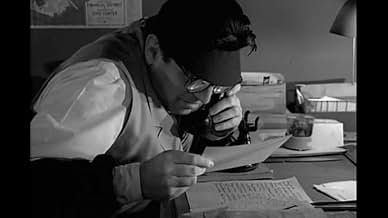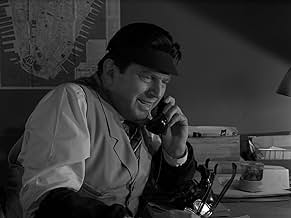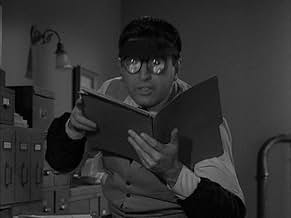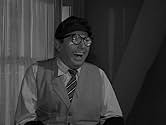Four O'Clock
- Episode aired Apr 6, 1962
- TV-PG
- 25m
IMDb RATING
6.4/10
2.4K
YOUR RATING
Obsessed Oliver Crangle wants to expose vice in the world, investigating people that he sees as evil, and then attempting to ruin their lives. His plan is to punish them all by an unspecifie... Read allObsessed Oliver Crangle wants to expose vice in the world, investigating people that he sees as evil, and then attempting to ruin their lives. His plan is to punish them all by an unspecified means at 4:00 this afternoon.Obsessed Oliver Crangle wants to expose vice in the world, investigating people that he sees as evil, and then attempting to ruin their lives. His plan is to punish them all by an unspecified means at 4:00 this afternoon.
Featured reviews
The foundations of a good episode are established with this ghastly character Crangle (Theodore Bikel) and his sanctimonious crusade against people leading less than saintly lives. He is a hypocrite, telling his landlady 'I mind my own business'. He does harm by anonymous phone calls and letter writing. Crangle's war on immorality is clearly the creepy, slithering nastiness of an obsessed coward who wont play the game and live his own life.
The story continues well throughout in the middle. Crangle's lack of humanity is further underlined when he receives a visit from Mrs Lucas (Phyllis Love) the wife of doctor he intends to expose for being 'imperfect'. This is a strong scene with Mrs Lucas questioning the crazy crusader and him mentioning communists among the 'evil' he targets. Then things get madder when Crangle hits on an idea- from this point the production suffers from a silly conclusion. A pity because there're still good moments as Crangle cherry picks by underlining only the parts he likes of The Gettysburg Address and displays his paranoia. Perhaps the end doesn't have to be taken literally? There could even be a clue with the parrot? Crangle is undeniably mad after all.
One truly far out, mad-bad character. Yet his type gets elected in democracies from time to time. He is sadly all too human.
The story continues well throughout in the middle. Crangle's lack of humanity is further underlined when he receives a visit from Mrs Lucas (Phyllis Love) the wife of doctor he intends to expose for being 'imperfect'. This is a strong scene with Mrs Lucas questioning the crazy crusader and him mentioning communists among the 'evil' he targets. Then things get madder when Crangle hits on an idea- from this point the production suffers from a silly conclusion. A pity because there're still good moments as Crangle cherry picks by underlining only the parts he likes of The Gettysburg Address and displays his paranoia. Perhaps the end doesn't have to be taken literally? There could even be a clue with the parrot? Crangle is undeniably mad after all.
One truly far out, mad-bad character. Yet his type gets elected in democracies from time to time. He is sadly all too human.
Rod's into monologue beside the parrot is hilarious because the bird looks at Rod, then the camera, then Rod, then the camera, etc.
Though, they then cut to a closeup of the bird, which ironically illustrates the problem of weaker episodes like this one. And that would be one note stories that are insanely on the nose that beat you over the head with their moral. Likewise, they cut from the great Rod/parrot scene to a parrot closeup to say See! We've got a bird that acts!
Though, they then cut to a closeup of the bird, which ironically illustrates the problem of weaker episodes like this one. And that would be one note stories that are insanely on the nose that beat you over the head with their moral. Likewise, they cut from the great Rod/parrot scene to a parrot closeup to say See! We've got a bird that acts!
Theodore Bikel stars as Oliver Crangle, a most vindictive, unpleasant man with a huge chip on his shoulder, and a strong desire to persecute and punish all those people he deems to be morally suspect or outright evil. He has many filing cabinets full of information of people that he uses to either get them fired, or harass them with phone calls. He one day hits upon the idea of shrinking all the evil people to about 2 Ft. tall at Four O'clock that day, but doesn't reckon on that depraved wish backfiring on himself... Bikel is quite good here, despite playing a deranged man with little back story. Quite thin and obvious really, but this still remains something of a guilty pleasure, with a most appropriate ending.
While the writing is heavy-handed and rather preachy, Bikel,s performance is superb insofar as you can watch him - in 20 minutes or so - sink believably into total paranoia. A good example of why one should always question the motives and mental health of a finger-pointer.
As a number of other commenters have noted, Rod Serling was never known for subtlety. This episode scores political points with a baseball bat over the viewer's cranium. The preaching almost makes you want to disagree just for the sake of disagreeing. It would have been fun to get Solzhenitsyn's take on Serling's high-decibel crusade against anti-communists.
Leaving politics aside, Theodore Bikel's performance is hilariously over the top. I'm not sure if he was chewing the scenery as a consciously ironic comment on Serling's loud sermon. Or maybe he was just having so much fun he couldn't stop. Either way, his performance is the only thing that makes the episode worth watching. And it gets all five of the stars I awarded.
The twist ending is telegraphed from the start and can't possibly surprise anybody who doesn't doze off during the episode. Unfortunately, Rod was too busy yelling politics to plot a less predictable conclusion.
Leaving politics aside, Theodore Bikel's performance is hilariously over the top. I'm not sure if he was chewing the scenery as a consciously ironic comment on Serling's loud sermon. Or maybe he was just having so much fun he couldn't stop. Either way, his performance is the only thing that makes the episode worth watching. And it gets all five of the stars I awarded.
The twist ending is telegraphed from the start and can't possibly surprise anybody who doesn't doze off during the episode. Unfortunately, Rod was too busy yelling politics to plot a less predictable conclusion.
Did you know
- TriviaThe original story by Price Day was first published in the April 1958 issue of Alfred Hitchcock's Mystery Magazine. It came to Rod Serling's attention when it was included in the hardcover anthology "Alfred Hitchcock Presents: My Favorites in Suspense" (Random House 1959).
- GoofsOliver Crangle's eyesight is obviously very poor, as he has to get very close to written documents, in spite of wearing very thick glasses. Yet, he has no issues seeing objects with his glasses off. He sees his clock from a fair distance as well as the pull on his blind, and multiple times reaching for the bird's food with no groping around at all. This only goes to show that Mr Crangle is extremely far-sighted.
- ConnectionsFeatured in Twilight-Tober-Zone: Four O'Clock (2023)
Details
- Runtime
- 25m
- Color
- Aspect ratio
- 1.33 : 1
Contribute to this page
Suggest an edit or add missing content


















